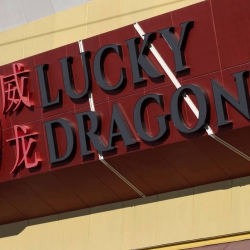Lucky Dragon Hotel & Casino, a Las Vegas gaming venue which opened in December 2016, announced last week that it has “temporarily” closed its gaming floor. Lucky Dragon’s owners announced they plan to re-open the casino “within six months”.
The closure is designed to collect new investors and install more gaming tables and slot machines. Lucky Dragon’s game selection appears to have been too heavily focused on baccarat.
When the Lucky Dragon Casino opened, it was designed to cater to Asian gamblers and, especially, Asian-American gamblers. The themes were Asian, but the cuisine and amenities also featured Chinese themes — down to architecture and dining options which paid attention to Feng Shui.
Most of the restaurants and shopping in the building, located just off the Las Vegas Strip near the Stratosphere, also closed last week. The 203-room hotel and the gift ship remain open.
Lucky Dragon Casino’s Closure
In a statement last week, Lucky Dragon’s ownership stated, “Effective immediately Lucky Dragon Hotel & Casino is beginning the process of repositioning and, in doing so, will have a reduction in staff while it temporarily closes all gaming and restaurant operations.”
The casino’s executives said that the decision to close temporarily was “difficult”, but necessary. The statement added that the “reorganization paves the way for Lucky Dragon to establish new partnerships that will enhance the property’s long-term positioning.”
Limited game selection appears to be the key factor in the Lucky Dragon’s financial troubles. The casino has a limited number of blackjack tables and slot machines, at least compared to other Vegas casinos. When the Lucky Dragon opened, it featured mainly baccarat, the most popular game in Asian casinos. Baccarat was the main driving force in the casino boom in Macau, Singapore, and the Philippines.
Baccarat in the USA
Baccarat also has proven more popular in the United States in recent years, as the Asian-American gaming community has flocked to US land-based casinos more often. Las Vegas Strip revenues have featured baccarat revenues more and more, while the preeminence of the Bethlehem Sands Resort & Casino in Pennsylvania’s land-based casino industry was attributed to the growing baccarat section — and Las Vegas Sands’ ability to market to Asian-Americans from the New York City area.
The calculation by Lucky Dragon’s ownership was an Asian-themed boutique casino off the Las Vegas Strip would attract a huge clientele. It appears, though, that baccarat alone cannot sustain a Las Vegas casino — even a boutique casino with 27,000 square feet of space.
3% Decline in Baccarat Revenues
Part of the problem might be market-driven. The Nevada Gaming Control Board reported that baccarat revenues had declined over 3% in the year after Lucky Dragon opened. Though the $1.18 billion in revenues was still impressive, it showed that fewer people interested in baccarat were visiting Las Vegas in 2017.
As late as March 2017, many gaming analysts believed the baccarat market would increase. Lucky Dragon Casino announced it would open a second high-roller lounge in that month, though the VIP lounge was never built.
Why Baccarat Revenues Declined
One issue might be declining US visits by Asian gamblers. Compelling statistics show that Las Vegas’s baccarat revenues fell from 2014 to 2016 as Macau’s baccarat revenues fell over the same time. While one might think China’s corruption crackdown might send Chinese high rollers to other venues — and there is evidence that some went to Singapore or Manila — it does not mean more Chinese VIPs are coming to the United States.
The Chinese corruption crackdown targeted Communist Party officials and wealthy businessmen. Because of concerns that those targeted might place their money overseas or simply flee the country, trips overseas by the VIPs are looked at a bit closer by the Beijing officials, just as restrictions were placed on visits to Macau. That usually meant that people could carry less cash on them. While other factors have an impact, it is one reason baccarat revenues have declined, even as far afield as Las Vegas.
North End of Las Vegas Strip
Location might be an issue, because the nearby SLS Las Vegas is undergoing financial difficulties, too. Those difficulties do not have to be permanent, though. Fontainbleau, which is near SLS Las Vegas, sold a few months back for $600 million.
Also, Wynn Resorts bought the 38 acres of the failed Alon Casino project, hoping to expand his company’s flagship casino-resort, the Wynn Las Vegas. At the time, Steve Wynn said he wanted “to change tourist visitation patterns in Las Vegas” with his expansion by “drawing more visitors to the north end of Las Vegas Blvd.”
If so, Wynn Las Vegas’s draw might give inadvertant help Lucky Dragon Casino, SLS Las Vegas, Fontainbleau, and Stratosphere.

